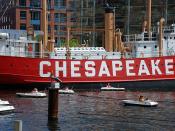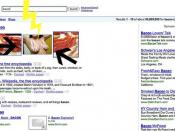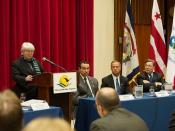Ch. 4
-Culture in Chesapeake: life is short due to diseases. Men outnumber women 6-1. There are weak marital ties due to premarital pregnancies (A 3rd of brides were pregnant b4 wedding). There was a pop. increase w/native-born ppl who developed immunities (Vir. most populous colony in 18th c)
-Tobacco in Chesapeake: It was good 4 tobacco cultivation. By 1700 Chesapeake exported 10 mill lbs of it a yr. The tobacco exhausted land& led to western expansion which agitated the Indians. Also, it led to overproduction when prices fell& created the need for the "headright system." This helped farmers who needed more workers& it awarded whoever brought over an indentured servant 50 acres of land. Yet, as land grew scarce, owners prolonged the original 7 yr contracts.
Bacon's rebellion: l667,men were frustrated by the lack of money,work, land(no vote), and women. The rebels were resentful of Vir. gov. William Berkley's friendly treatment of the Indians (since he monopolizes the fur trade).
The rebels massacred Indians when Berkley refused to retaliate against Indian attacks on the frontier. The leader, Nathaniel Bacon died of disease and Berkeley crushes the uprising, pitting frontiersmen against aristocracy & promoting the use of black slaves.
Slavery: out of the 10 mil black slaves only 400,000 were brought to the US over 3 siglos By the mid 1680s black slaves outnumbered white servants.In 1663 slaves codes made slaves and their kids property for life of their masters.Rice plantations in the deep South were more physically demanding while the tobacco plantations were a bit easier& closer allowing communication& population to increase among black slaves. In 1712 there was a slave revolt in NY city. 12 whites died and 21 blacks were executed Then, in 1739 blacks revolted in SC& tried to march to Span. Florida.
S. Society: There was a social gap between the First Families of Virginia (FFV) who, practically dominated the legislature, and small planters who were the largest social group. The life expectancy was 30 yrs so 16 yr old boys paid taxes. Cities were slow to develop since plantations were self-sufficient.
New England: They had a life expectancy of about 70 yrs. They migrated as a family& had a more stable life (lower pregnancy rate/invented grandparent). There was a population boom since women married& had babies until menopause. At the same time there a high death rate 4 child birth. In the S. colonies women had more power since men died young& they could retain a separate title to their prop.& the right to inherit the husbands estate. But, in New England the opposite was true& divorce was rare.
Life in the New England towns: The towns were legally chartered. if there were > than 50 families the town was required 2 provide elementary edu.& if there > than 100 they had 2 provide 2ndary edu. In 1636 Harvard was founded to train boys to become ministers.
Religion: Jeremiad preachers hoped to improve faith by scolding ppl for waning piety. The Halfway covenant allowed the unconverted children of the church members to have partial rights. In 1692 The Salem trials were started when girls claimed to have been bewitched. 20 ppl&2 dogs died& the accusers tended to be poor while the "witches" were wealthy. This continued until the governors' wife was accused& prohibits more trials. New England was less ethnically mixed but the climate diversified industry& agric.Owning slaves was costly& pointless.They disliked the indians for underutilizing the earth. Livestock sped erosion since they had big appetites& their hooves compacted the soil. Experts in trade.
The early settlers: lived a simple life but one that was better than in Europe. The aristocracy resented poor ppl& passed laws to keep them in place. i.e. in 1651 there was a law prohibiting poor ppl to wear gold/ lace.
Leisler's rebellion: caused by Bacon's rebellion(1676). There was animosity in NY between land-holders and merchants.
Ch. 5 ( notes are missing)
1700 < less than 300,000 ppl. By 1775 there were 2.5 mil ppl in the 13 colonies (pop. doubled every 25yrs). Out of the 32 colonies Br. had only 13 revolted. Jamaica& Canada were wealthier than the 13. The average age was 16. Most of pop. was stuck E. of the Alleghenies. 90% of the area was rural.
Cult diversity: Ger: 6% of the pop by 1775, fled rel/econ oppression& war. It consisted of mainly protestant Lutherans that settled in Penn&had no loyalty 2 Br. Scots-Irish: Presbyterian group hated by the Irish Catholics. Their econ was hampered due to restrictions on wool/linen& went 2 Penn. They were squatters who argued both w/Indians& white settlers.In 1764 the Irish led the march of Paxton Boys in Philadelphia protesting the Quakers lenient policy w/Indians.
*Colonial Society: Gods of War: contributed to signs of stratifications since armed conflicts enriched merchant princes(mil. suppliers) in New Eng.& middle colonies. Incoming indentured servants, London involuntarily shipped over convicts& SC fear a black rebellion so they attempted to restrict/halt the importation of slaves but Br vetoed this.most honored profession: clergy. Physicians: most were poorly trained& distrusted. Lawyers were seen as trouble makers& criminals defended themselves but by 1750 lawyers were seen as useful.
Work in America: agric. was the leading industry. Tobacco was the staple crop of Maryland& Vir., wheat was the staple of Chesapeake& the middle colonies.by 1759 NY exported 80,000 barrels of flour a yr. Fishing was the key industry of New Eng. which exported dried cod this in turn stimulated shipbuilding. The triangular trade started w/a cargo of rum that left N. Eng 2 be sold in Africa 4 slaves which were exchanged for molasses to be sold in N. Eng to be distilled into rum. Lumber was the only vital manufacturing activity. The tallest trees were marked 4 the king causing resentment among colonists(although the navy was built in their defense). The Molasses Act of 1733 was urged by Br. W. Indian planters aimed at crushing N. American trade w/ Fr. w. Indies. However, this failed due to Amer.smuggling.
Transportation: dirt roads connected major cities. Stage coach travel was risky(ppl sign wills). Waterways were filled since it was cheap/pleasant altho it was slow. Taverns provided entertainment.
Dominant religions: The Anglican/congregation were tax supported churches est. in 1776. The Church of Eng.(Anglicans) was the main faith in Georgia, N&S Carolina, Vir, Maryland& part of NY. The congregational church in founded in all New Eng. colonies except Rhode island.
Great Awakening: Johnathon Edwards: emotional preaching methods. George Whitefield was even better than Edwards when he started 4 yrs later.Made Edwards weep.The old lights distrusted these new lights. New lights centers were founded such as Princeton& Dartmouth focused on emotional feeling, belief in predestination but you can make a covenant w/God to go to heaven.
Education: vital in N. Eng. since it was used 2 train clergy. Emphasis on rel& classical languages. Discipline severe.
Culture in the backwoods: art was frowned upon. John Copely headed to England to complete his career. The log cabin was Sweden. Colonial lit. undistinguished except, a slave girl, phillis Wheatley, who had never been formally educated went to Eng.& published a book of verse that showed the influence of Alexander Pope. Ben Franklin's Poor Richards Almanac was influential and contained maxims which were widely read in Eur&Amer. There were few libraries since only the rich could buy books. John Peter Zenger was sued for libel but Hamilton defended him and won. So the freedom of press was ensured.
CH. 6
Fr: had difficulties colonizing becuz of rel. wars during the 1500s between the RCC& the Huguenots. The Edict of Nantes(1598) granted limited toleration to Fr. protestants(not jews/atheists) so war ceases. King Louis XIV had an interest in oversea colonies so in 1608 ,Samuel de Chaplain, "father of New France" established Quebec. They become friendly w/the Hurons& foughtt w/them against the Iroquois who, later on, hinder penetration in2 Ohio. Fr. colonists didn't immigrate to N.A. by the hordes since peasants were poor, Huguenots not allowed to leave& there was no econ reason to do so. The sole resource of New Fr. was the beaver. Indians were recruited 4 the fur trade but they died from disease, debauched by alcohol& killing beavers violated their beliefs. The beaver pop. was practically extinct. Jesuits struggled zealously to convert Indians. Antoine Cadillac founded Detroit in 1701 to keep Eng. from going in2 Ohio. Robert de la Salle est. Louisiana(1683) to check Sp. but is murdered by his men when he is unable to find it again in an expedition(1687). Kaskaskia, Cahokia, & Vincennes exported grain.
Br v Fr: King William's War (1689-97) and Queen Anne's War (1702-1713). Fr. coureurs de bois v. Br. colonies& any Indian allies they may have. Br. fails in capturing Quebec& Montreal but does capture Port Royal in Acadia. In 1713 the Utrecht peace deal gave Acadia, Newfoundland& Hudson Bay to Eng
The war of Jenkin's ear: Starts in 1739 , Fr. allies itself w/Sp but Eng. captured Fortress of Cap Breton Island. The 1748 treaty gives back Louisbourg 2 Fr.
Ohio Valley: It was good land that became a battle ground 4 the Sp,Br& Fr. In 1754 the gov. of Vir. sent Washington to Ohio in command of about 150 men(Br. had shaky legal rights to 500,000 acres in ohio at the same time the Fr. were building Fort D) encountering some Fr. about 40m from Fort Duquesne the troops opened fire. The Fr. later returned& surrounded Fort Necessity, which surrendered after a 10 hr siege. Washington was permitted to march his soldiers w/ the full honors of war. This started...
The Seven Years War/ fr.&Indian war: Eng.& Prussia v. Fr,Sp, Austria& Russia. Frederick the Great gained his title when he repelled Fr, Austrain& Russian forces despite being outnumbered. Americans lacked unity so this led to the 1754 intercolonial congress in Albany, NY to keep Iroquois loyal& bolster unity(fail at both). Ben Franklik: fragmented serpent cartoon; join or die
Bradock: is sent from Br& is defeated along w/his 2000 men. This easy victory encouraged Indians to go start scalping leading to bounties 4 Indian scalps. William Pitt "the Great commoner" took the lead& attacked the Fr. West Indies& concentrated on Quebec/Montreal. In 1758 Louisbourg fell after a siege. James Wolfe commanded an army that scaled cliff walls& defeats Quebec on a night attack. Commanders form both armies are fatally wounded. When the Montreal fell in 1760 it was the last time the Fr. flew a flag on Amer.
Peace treaty of 1763: Br. received Canada. Fr retained small/valuable sugar islands in the West Indies& gave Louisbourg to Sp.
Colonists: felt confident& no longer believed in Br invincibility. Friction developed between the 2. Br refused to recognize any Amer. officers above the rank of capt. Amer. secretly traded w/the enemy. Amer. colonels refused 2 fight until Pitt offered to reimburse them. Americans found that despite the difference in distance they were similar in many ways. After the war the Indians could no longer play the powers against each other.
Pontiac: realized that the Indians no longer had the advantage of playing the powers against each other& makes 1 last attempt w/the Fr 2 drive out Br but he dies. Then, the Lon. Govt. issues the Proclamation of 1763 which says the colonists cant move beyond the Appalachians. It was done 2 keep the colonists safe from Indians but they viewed it as an act of oppression& defied it.



Ok
This is not a paper its more of a word then definition, but will help for people who need the true meanings of those, but again as said this is not a paper
1 out of 1 people found this comment useful.